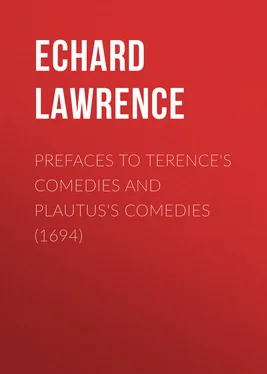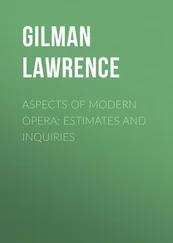Lawrence Echard - Prefaces to Terence's Comedies and Plautus's Comedies (1694)
Здесь есть возможность читать онлайн «Lawrence Echard - Prefaces to Terence's Comedies and Plautus's Comedies (1694)» — ознакомительный отрывок электронной книги совершенно бесплатно, а после прочтения отрывка купить полную версию. В некоторых случаях можно слушать аудио, скачать через торрент в формате fb2 и присутствует краткое содержание. Издательство: Иностранный паблик, Жанр: Критика, foreign_antique, foreign_prose, на английском языке. Описание произведения, (предисловие) а так же отзывы посетителей доступны на портале библиотеки ЛибКат.
- Название:Prefaces to Terence's Comedies and Plautus's Comedies (1694)
- Автор:
- Издательство:Иностранный паблик
- Жанр:
- Год:неизвестен
- ISBN:нет данных
- Рейтинг книги:4 / 5. Голосов: 1
-
Избранное:Добавить в избранное
- Отзывы:
-
Ваша оценка:
- 80
- 1
- 2
- 3
- 4
- 5
Prefaces to Terence's Comedies and Plautus's Comedies (1694): краткое содержание, описание и аннотация
Предлагаем к чтению аннотацию, описание, краткое содержание или предисловие (зависит от того, что написал сам автор книги «Prefaces to Terence's Comedies and Plautus's Comedies (1694)»). Если вы не нашли необходимую информацию о книге — напишите в комментариях, мы постараемся отыскать её.
Prefaces to Terence's Comedies and Plautus's Comedies (1694) — читать онлайн ознакомительный отрывок
Ниже представлен текст книги, разбитый по страницам. Система сохранения места последней прочитанной страницы, позволяет с удобством читать онлайн бесплатно книгу «Prefaces to Terence's Comedies and Plautus's Comedies (1694)», без необходимости каждый раз заново искать на чём Вы остановились. Поставьте закладку, и сможете в любой момент перейти на страницу, на которой закончили чтение.
Интервал:
Закладка:
The two volumes are a testimony to Echard’s remarkable industry and abilities. They were published the year before he took his M.A., when he was only twenty-four. In the years between coming up to Cambridge in 1687 and 1695, he found time not only to satisfy his university, and to do the very considerable amount of hack work which appeared in 1691 and 1692, as well as embarking upon his large historical works, but also translated two difficult Roman authors with great verve.
It would be interesting to know why, in the years between 1691 and 1694, Echard turned his attentions to the art of translation. The venture is a curious deviation from his otherwise single-minded devotion to history and to journalistic enterprises (the only other translation he is known to have done is the brief “Auction of the Philosophers” in The Works of Lucian [1710-11]). The connection of Dr. John Eachard and Sir Roger L’Estrange may offer a slight clue. Echard was closely related to Dr. Eachard (1636? -1697), Master of Catharine Hall, Cambridge, and author of the lively dialogue, Mr. Hobbs’s State of Nature Consider’d (1672). 5 5 Recently republished with an introduction by Peter Ure as No. XIV (1958) in the University of Liverpool Reprints.
With a family connection such as this, Echard might well have hoped for a successful career centered on his stay at Cambridge. The dedication of his A Most Complete Compendium in 1691 to the Master of his own college, Dr. John Covel, suggests that he was looking in this direction. L’Estrange is important not only for his intimate knowledge of the publishing trade, but also because he was a translator in his own right. His Æsop appeared in 1692, and he had early put out translations of Quevedo (1673), Cicero (1680), and Erasmus (1680), and was to go on to translate Flavius Josephus (1702). Since L’Estrange had also been a student at Cambridge, there is some possibility that the translation of Terence was carried out at the instigation of a Cambridge based group. The translation might also be connected with the resurgence of interest in translation and in “correctness” which can be discerned in the 1690’s. 6 6 “Dryden, Tonson, and Subscriptions for the 1697 Virgil ,” PBSA , LVII (1963), 147-48. Raymond Havens makes a rather different emphasis in his “Changing Taste in the Eighteenth Century,” PMLA , XLIV (1929), 501-18.
The two Prefaces differ somewhat in character. It seems clear from remarks made in the Preface to the Plautus that it was written after the Terence had already reached the public and after Echard’s copy for the text of Plautus’s three comedies was in the printer’s hands. Not surprisingly the later Preface is hurried, and at times almost casual. The Preface to the Terence is more ambitious, more carefully written, and more wide-ranging, though giving fewer examples of the kinds of translations made by Echard. Both Prefaces lay claim to substantially the same audience. That to the Terence explains that the translation was undertaken in the first place because of the literary value of Terence’s comedy. In consequence, its benefits would apply to “most sorts of People, but especially for the Service it may do our Dramatick Poets .” Secondly, the work was undertaken for “the Honour of our own Language , into which all good Books ought to be Translated, since ’tis now become so Elegant, Sweet and Copious ..” Thirdly, it might rival the translations done in other countries, particularly those in France. The audience envisaged ranged from schoolboys, who would find the translation less Latinate and the notes more pointed than those of Bernard or Hoole, to “Men of Sense and Learning,” who ought to be pleased to see Terence in “modern Dress.” As for the dramatists, Terence might serve as an exemplar, especially since the translation could “be read with less Trouble than the Original.” (pp. xvii-xix). The Plautus Preface is far less detailed, but refers back to these reasons, while stressing the function of the translation for the schoolboy. Judging by the number of editions, the Terence found its market, for where the Plautus ran to only two editions, the first and that of 1716, the Terence appeared in a seventh edition in 1729. Nor was Echard’s audience merely made up of students. If one of his main targets was contemporary dramatists, he would have been elated to learn that William Congreve owned a copy of the first edition of both translations. 7 7 Items 450 and 595 in The Library of William Congreve , ed. John C. Hodges (New York, 1955). Project Gutenberg e-text 27606
The Prefaces are perhaps a little disingenuous in acknowledging Echard’s and his collaborators’ debt to the contemporary French classical scholar and translator, Anne Dacier. On both occasions Echard paid her some tribute. What he does not mention is that the two volumes seem to be modelled on her example. The Terence translates the plays which had appeared in her Les comédies de Térence (Paris, 1688), and it is significant that despite his claims that he wished to translate more than three of Plautus’ comedies, he in fact translated only those three which Mme. Dacier had already done in her Les comédies de Plaute (Paris, 1683). Moreover, the notes and to some extent the Prefaces, are modelled on the French scholar’s work: Echard’s notes are often directly dependent upon Mme. Dacier’s and are exactly described by her account of her own volume as being “avec de remarques et un examen de chaque comédie selon les règles du theatre.”
The views on translation put forward by the Prefaces are an intelligent exposition of progressive contemporary notions of the art. The belief in literal translation which characterizes Jonson and Marvell in the earlier years of the century had been displaced by the more liberal concept of “imitation.” Roscommon is a representative of this freer attitude, while Dryden’s more severe theory of “paraphrase,” whatever his practice may have been, stands somewhere between the two positions. Like Ozell and Gildon, and later Pope, Echard’s aim, whether translating by himself or collectively, was to imitate the spirit of his author in English. “A meer Verbal Translation is not to be expected, that wou’d sound so horribly, and be more obscure than the Original.. We couldn’t have kept closer.. without too much treading upon the Author’s Heels, and destroying our Design of giving it an easie, Comick Style , most agreeable to our present Times” ( Terence’s Comedies , p. xx). To this end it was necessary to tone down the “familiarity and bluntness in [Terence’s] Discourse” which were “not so agreeable with the Manners and Gallantry of our Times.” This was intended to bring Terence up to the level of gentility for which he was credited by compensating for the barbarity of Roman social manners. But the translation was willing to go further than this: it added to the Roman comedy what Echard thought English comedy excelled in, “humour” – “In some places we have had somewhat more of Humour than the Original, to make it still more agreeable to our Age..” ( ibid. , p. xxii). When speaking for himself alone in the Preface to the Plautus , Echard’s claims were less grandiose. Here the translation seems much more specifically aimed at schoolboys, and Echard made firm claims for his literalness (sig. b1-2v). On the other hand, he went out of his way to praise Dryden’s Amphitryon (1690) for the freedom it had taken with the original, which, said Echard, “may serve for one Instance of what Improvements our Modern Poets have made on the Ancients, when they built upon their Foundations” (sig. b3v-4).
Читать дальшеИнтервал:
Закладка:
Похожие книги на «Prefaces to Terence's Comedies and Plautus's Comedies (1694)»
Представляем Вашему вниманию похожие книги на «Prefaces to Terence's Comedies and Plautus's Comedies (1694)» списком для выбора. Мы отобрали схожую по названию и смыслу литературу в надежде предоставить читателям больше вариантов отыскать новые, интересные, ещё непрочитанные произведения.
Обсуждение, отзывы о книге «Prefaces to Terence's Comedies and Plautus's Comedies (1694)» и просто собственные мнения читателей. Оставьте ваши комментарии, напишите, что Вы думаете о произведении, его смысле или главных героях. Укажите что конкретно понравилось, а что нет, и почему Вы так считаете.












